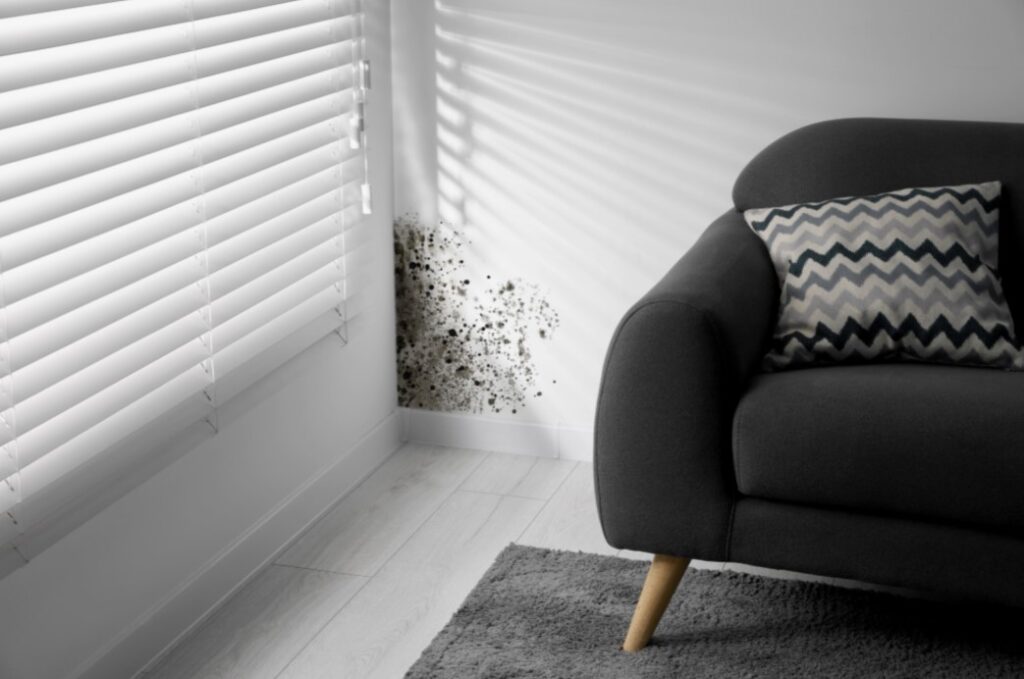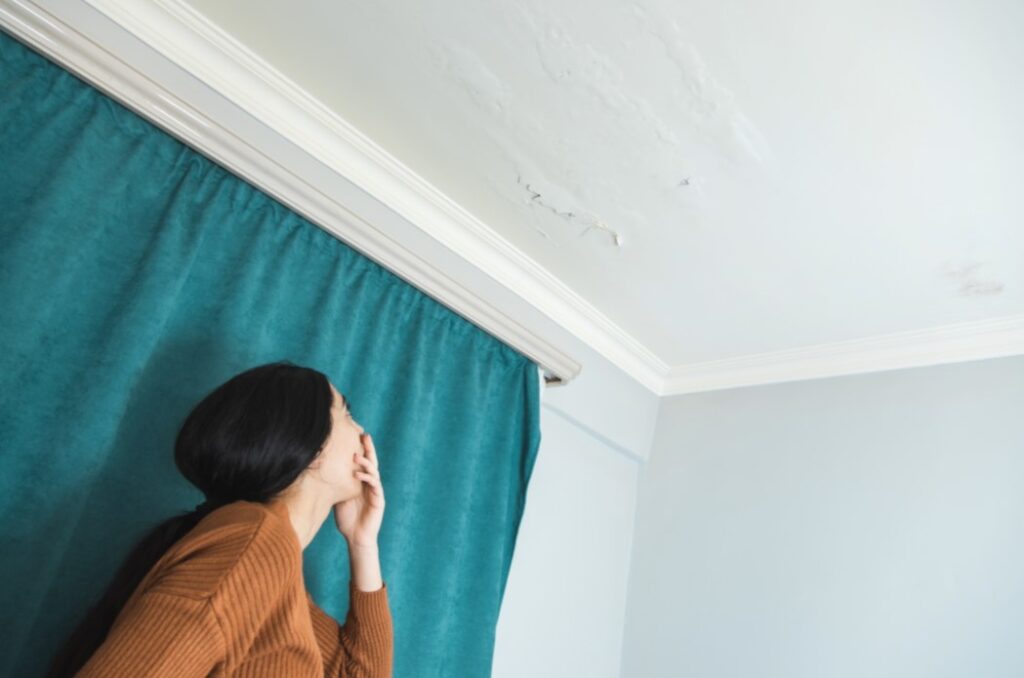
Mold growth is more than just an unsightly issue; it’s a serious concern that can lead to health risks and devalue a rental property. In New Jersey, mold problems have sparked significant discussions around the responsibilities of landlords and tenants. When does a mold problem become the responsibility of the Jersey residential landlord? How does Jersey’s landlord-tenant law interpret these cases?
In New Jersey, the responsibility of landlords regarding mold in rental properties and apartments is not explicitly governed by federal or state laws. While there’s no specific regulation, landlords are obligated by the “implied warranty of habitability” to provide tenants with livable conditions, potentially encompassing mold issues. However, the lack of specific laws addressing mold in New Jersey leaves room for interpretation. Landlords may be held liable if they are aware of a mold problem and fail to address it, leading to health problems for tenants.
Proposed legislation, such as the Mold Safe Housing Act, aims to protect renters by calling for mandatory mold inspections and reimbursement of relocation costs if remediation requires tenants to move out. However, as of now, the legal landscape remains complex, and tenants may resort to self-help strategies like rent withholding or independent mold cleanup, knowing that disputes might lead to eviction proceedings.
Understanding the Nature and Growth of Mold
Mold is a type of fungus that thrives in warm, damp, and humid environments. It reproduces through tiny, airborne spores that travel until they find a suitable moist surface to grow on. This ubiquitous organism can be found both inside and outside, but it becomes problematic when it proliferates indoors, especially within residential properties.
The Impact of Mold on Health
Prolonged mold exposure can lead to a host of health issues. These range from minor irritations like sneezing, coughing, and skin rashes to more severe conditions such as allergic reactions, respiratory problems, and other mold-related illnesses. In certain cases, the health implications can be severe, leading to chronic conditions such as asthma and lung infections.
When mold infiltrates your apartment, symptoms like rashes, fatigue, and respiratory issues may arise. While reporting to the property manager is the initial step, the municipal Departments of Code Enforcement lack authority for testing or remediation.
Absence of Regulatory Safeguards The absence of state and local regulations on mold, a nationwide predicament originating from the EPA, leaves New Jersey’s approximately 1 million renters vulnerable. Landlords are not mandated to remediate mold, and the state lacks cleanup standards.
Crisis in Federally Subsidized Housing For those in federally subsidized housing, mold poses a severe crisis. A 2019 US Census Bureau survey reveals that tenants in HUD-subsidized housing are almost twice as likely to inhabit mold-infested dwellings.
Mold Contamination and Property Value
Mold contamination doesn’t just affect the health of the occupants; it also has a significant impact on property value. Mold can cause structural damage to buildings, negatively affecting their integrity, safety, and aesthetic appeal. For a New Jersey residential landlord, a history of mold contamination can devalue the property and make it challenging to attract potential tenants.
The Importance of Regular Mold Inspections
Regular mold inspections and testing are essential for early mold identification and to discover mold before it becomes a major issue. While there isn’t a specific federal law covering mold contamination, landlords are expected under general premises liability laws to maintain a safe and habitable environment. This means they could be held liable for any health issues resulting from mold exposure in their properties.

The Role of Professional Remediation Services
In regions like Monmouth County and Ocean County, New Jersey, where the humidity levels can be high, companies like MasterTech Environmental Jersey Shore play a crucial role. Specializing in mold remediation, water damage, and biohazard cleanup, we ensure homes and businesses remain mold-free. Our comprehensive mold remediation process, coupled with their expertise in water damage and biohazard cleanup services, provides a compassionate and professional approach to these sensitive issues.
The Legal Framework in New Jersey: Landlord Responsibilities and Tenant Rights
In the state of New Jersey, the balance of power between landlords and tenants is maintained through a series of laws. Central to these is the “Warranty of Habitability,” a pivotal piece of legislation with far-reaching implications.
The “Warranty of Habitability” in New Jersey
The “Warranty of Habitability” is implicit in every residential lease agreement in New Jersey. It ensures that landlords are legally bound to provide a safe and livable environment for their tenants. This means addressing and resolving any issues that could potentially harm the tenant’s health or safety, such as mold contamination.
Mold Disclosure Landscape
New Jersey lacks statutes mandating landlords to disclose mold concentrations to tenants. However, landlords must inform prospective tenants about a property’s location in a flood zone or area.
Legislative Struggle for Tenant Protections
State Sen. Robert Singer persistently introduces the Mold Safe Housing Act (S81) to protect renters from mold infestation. Although reintroduced annually since 2013, progress has been slow. Recently, Sen. Linda Greenstein signed on as a cosponsor, and an identical bill (A4039) has been introduced in the Assembly.
Tenant Options Amid Landlord Inaction
Facing landlord inaction, renters can either withhold rent for uninhabitable conditions due to mold or self-remediate and withhold rent to cover costs. However, eviction threats loom, and the lack of state protections disproportionately affects low-income renters, leaving them susceptible to mold-related hardships.
In New Jersey, tenants have legal avenues following a mold outbreak. “Rent withholding” allows tenants to cease rent payments, citing inhabitable conditions due to mold. The “repair and deduct” strategy empowers tenants to handle mold cleanup independently, deducting costs from their rent.
The Role of Professional Remediation Services
In complex situations like these, professional companies like MasterTech Environmental Jersey Shore can be invaluable. Serving Monmouth County and Ocean County, New Jersey, MasterTech specializes in mold remediation, water damage, and biohazard cleanup. Our mold remediation process is designed to keep homes and businesses mold-free, helping landlords fulfill their obligations under the “Warranty of Habitability.”
MasterTech also offers services like death cleaning and hoarder cleaning, which, due to their sensitive nature, require a compassionate and professional approach.
Are NJ Landlords Responsible for Mold?
In New Jersey, the question of who is responsible for mold in rental properties can be complex. There are no federal or state laws specifically addressing a landlord’s responsibilities when it comes to mold. However, under the general premises of landlord-tenant law, landlords are expected to provide a safe and habitable living environment for their tenants. This could potentially extend to addressing mold issues.
When are Landlords Liable for Mold Problems?
Landlords may be held liable for mold problems if they are aware of a mold issue and fail to address it, leading to health problems for tenants. This falls under the “Warranty of Habitability,” which requires landlords to maintain safe and livable conditions in their properties. If a tenant successfully proves in court that the landlord neglected to remediate a known mold issue, the judge may order the landlord to have the mold remediated.
Moreover, if the mold problem arises due to the landlord’s failure to repair water damage or other underlying conditions that encourage mold growth, the landlord could be held responsible.
Instances When the Tenant Might Be Held Responsible
On the other hand, a tenant might be held responsible for mold growth if their actions or negligence contribute to the problem. For example, if the tenant fails to ventilate the property properly, causing excessive humidity which leads to mold growth, or if the tenant causes water damage that leads to mold, they might bear the responsibility.
Security Deposit Deductions
If a tenant’s actions or negligence lead to mold growth (for example, by failing to ventilate the property properly or causing water damage), then the tenant might bear the responsibility.
Landlords in New Jersey can deduct mold cleanup costs from a departing tenant’s security deposit, provided they furnish a written explanation within 30 days of lease termination. Any remaining deposit must be returned along with documentation of damage deductions.
Is Mold The Responsibility Of The Landlord?
Managing mold contamination in rental properties can be a complicated issue in New Jersey. Both landlords and tenants have responsibilities, with the overarching goal of maintaining safe, habitable living conditions. Landlords bear a significant burden under the “Warranty of Habitability,” necessitating regular inspections and prompt remediation of mold problems.
However, tenants too must ensure proper ventilation and avoid actions that could lead to mold growth. Companies like MasterTech Environmental Jersey Shore serve as a valuable resource, offering professional remediation services to help maintain a mold-free environment. It is through the collaborative efforts of landlords, tenants, and professionals that a healthy living space can be achieved and maintained.
